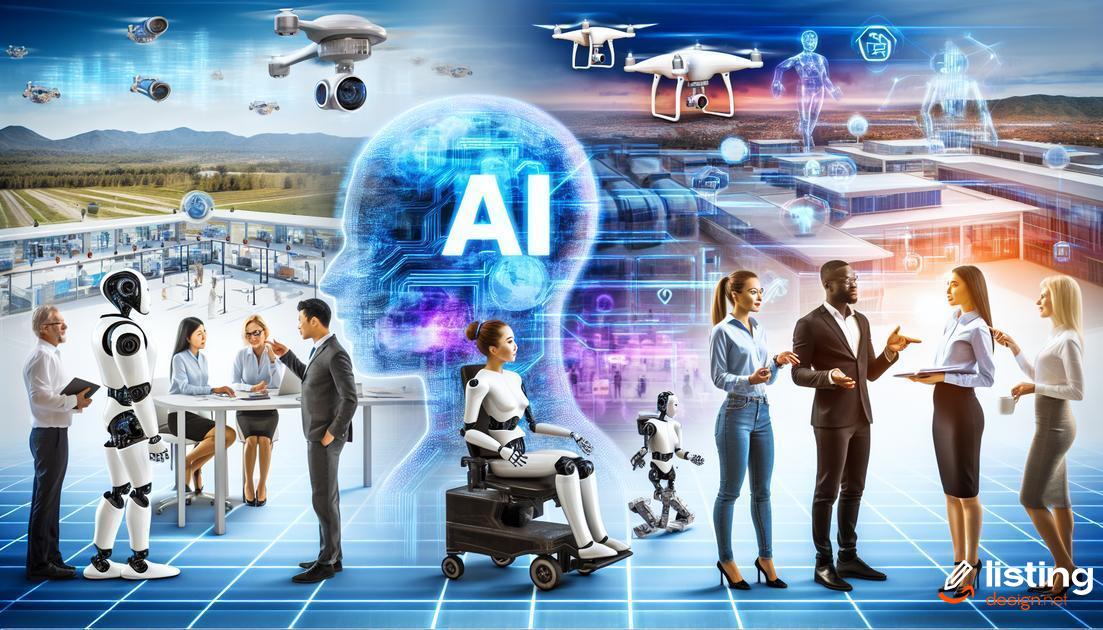Amazon AI innovations are at the forefront of technological advancement, revolutionizing multiple industries. From e-commerce to healthcare, the impact of Amazon’s artificial intelligence is substantial and far-reaching. This article delves into how these innovations are transforming sectors and what the future holds. By understanding these advancements, businesses and individuals can better navigate the evolving tech landscape.
Table of Contents
Introduction to Amazon AI Innovations
Amazon AI Innovations are at the forefront of technological advancements, shaping various sectors and industries. These innovations are not just limited to theoretical aspects; they are pragmatic and highly applicable solutions driving significant transformation across multiple domains. Artificial intelligence at Amazon is embedded in services like Alexa, Amazon Web Services (AWS), and personalized shopping experiences, extensively leveraging machine learning, deep learning, and natural language processing to create value and elevate user experiences.
The extensive use of AI by Amazon enables enhanced analytics, operational efficiency, and customer engagement. For instance, their AI algorithms power product recommendations that cater to user preferences, thereby improving the overall e-commerce experience. Moreover, AI-driven forecasting tools assist retailers in managing inventory with greater accuracy, minimizing both overstock and stockouts.
Deep learning models contribute significantly to the natural language understanding capabilities of Alexa, making interactions more intuitive and conversational.
Amazon Web Services
(AWS) offers robust AI services and tools that help organizations of all sizes integrate sophisticated AI functionalities into their operations. These include AWS SageMaker for building, training, and deploying machine learning models, and Amazon Rekognition for image and video analysis.
The continuous evolution of these AI innovations highlights Amazon’s commitment to pioneering cutting-edge technology and providing scalable, intelligent solutions that drive industry-wide transformation.
Impact on E-commerce

Amazon’s AI innovations have significantly transformed the e-commerce sector. One of the most notable impacts is the enhancement of recommendation engines. By leveraging machine learning algorithms, Amazon can provide highly personalized product recommendations, increasing both customer satisfaction and sales. Additionally, AI-driven demand forecasting helps in efficient inventory management, reducing overstock and stockouts. Another crucial aspect is the improvement of customer service through AI-powered chatbots and virtual assistants, which offer prompt and accurate support.
Moreover, the integration of AI in e-commerce facilitates better fraud detection systems, ensuring a safer shopping environment. Through natural language processing, AI also enhances search functionalities, enabling customers to find products more effectively. As a result, the overall shopping experience on Amazon has become more intuitive and user-friendly.
Transforming Healthcare
Amazon AI is making significant strides in the healthcare sector, reshaping how services are delivered and improving patient outcomes. One of the key innovations is the use of AI for predictive analytics, allowing healthcare providers to foresee potential medical conditions before they manifest. By analyzing vast amounts of data from patient records, Amazon AI can identify patterns and suggest proactive treatments.
Moreover, AI-powered diagnostic tools are revolutionizing the way doctors and nurses diagnose ailments. These tools leverage machine learning algorithms to offer more accurate and faster diagnosis, which is crucial for conditions where time is a critical factor. Hospitals and clinics are already seeing the benefits of these technologies in terms of efficiency and precision.
Another critical area Amazon AI is influencing is drug discovery and development. The traditional process of developing new medications is time-consuming and costly. Amazon’s AI models significantly reduce the time required for identifying potential drug candidates by rapidly analyzing chemical compounds and their interactions. This accelerates the path from lab to market, bringing potentially life-saving drugs to patients faster.
AI-driven robotic systems in surgeries represent another groundbreaking innovation. These systems provide surgeons with enhanced precision and control, minimizing errors and improving patient recovery times. Features like real-time data analysis and predictive analytics assist surgeons in making informed decisions during operations.
Lastly, Amazon AI has made strides in personalized medicine. By analyzing genetic information and patient history, AI can suggest treatments tailored to an individual’s unique needs. This personalization extends to aftercare plans, ensuring patients get the most effective care post-treatment.
Enhancements in Cloud Computing

Cloud computing has significantly evolved with the introduction of innovative artificial intelligence solutions by Amazon. One of the key enhancements is the integration of machine learning capabilities with cloud infrastructure. This not only improves the efficiency of data processing but also enhances scalability and flexibility for businesses.
The use of Amazon AI in cloud computing allows for real-time data analytics and automation, driving better decision-making across various industries. These advancements help companies to swiftly identify patterns, predict trends, and respond to market dynamics more effectively. Additionally, security features have also been upgraded, ensuring that data remains protected with the highest standards.
Implementing Amazon AI in cloud services means reduced operational costs and optimized resource management. This facilitates a more efficient deployment of applications, resulting in a faster time-to-market for new products and services. Furthermore, the enhanced cloud computing infrastructure supports a wide range of AI solutions, including natural language processing, image recognition, and predictive analytics.
Advancements in Machine Learning
Amazon has consistently invested in machine learning technologies, driving impressive advancements that have substantial impacts across various industries. One of the notable areas is the improvement of natural language processing (NLP) capabilities in its services. For instance, Amazon Comprehend uses NLP to analyze and understand human language, facilitating better customer service interactions and automating tasks that once required human intervention.
Additionally, computer vision advancements play a crucial role. Amazon Rekognition can now identify objects, people, text, scenes, and activities in images and videos with remarkable accuracy. This technology is being used not only for retail analytics but also for enhancing security and streamlining operations in smart cities.
Another significant area is in the development of sophisticated predictive analytics. Amazon SageMaker enables developers to build, train, and deploy machine learning models quickly. This allows businesses to predict consumer behavior, manage supply chains more effectively, and optimize their operations using actionable insights derived from vast amounts of data.
Moreover, the integration of machine learning into Amazon Web Services (AWS) has democratized access to powerful AI tools. This enables startups and enterprises alike to leverage advanced machine learning models without the need for substantial infrastructure investment.
Amazon AI in Financial Services

Amazon’s AI innovations are significantly impacting financial services, offering solutions that enhance decision-making, streamline operations, and improve customer experiences. Fraud detection is one area where Amazon AI excels. By using machine learning algorithms, it can identify suspicious transactions in real-time, reducing fraud incidents and saving financial institutions significant losses.
Another application is in risk management. Amazon’s AI systems analyze vast amounts of data to assess risks accurately, aiding banks and financial institutions in making informed decisions. These insights help in better credit scoring and loan approvals, minimizing the risk of default.
Customer service has also seen a transformation with the introduction of AI-driven chatbots and virtual assistants. These tools provide 24/7 support, handle routine inquiries, and offer personalized advice, thus enhancing customer satisfaction and reducing operational costs.
Amazon AI is also used in automating regulatory compliance. It ensures that financial institutions comply with the ever-evolving regulations by continuously monitoring and analyzing transactions and other relevant data.
The Future of Work with Amazon AI
The Evolution of Work with Amazon AI
Amazon AI is reshaping the workplace by automating mundane tasks and optimizing workflows. For instance, Amazon’s AI-driven platforms like Alexa are revolutionizing customer service by handling inquiries efficiently and improving response times. This not only enhances customer satisfaction but also frees up human employees to focus on more complex issues.
Furthermore, tools like Amazon SageMaker are enabling data scientists and developers to create, train, and deploy machine learning models at scale. This means that organizations can leverage advanced analytics to make informed decisions swiftly.
The integration of AI in human resources is another significant development. With Amazon’s AI tools, companies can streamline the recruitment process by automating resume screening and candidate matching, making the process quicker and more accurate.
Moreover, Amazon AI assist in upskilling employees through personalized learning and development programs. By analyzing individual performance data, AI can recommend tailored training modules, ensuring continuous professional growth.
Challenges and Opportunities Ahead

The rapid development of Amazon AI technologies presents both significant challenges and immense opportunities across various industries. Adapting to rapid technological change can be difficult for businesses and employees alike. Companies may struggle with the integration of AI systems into their existing operations, necessitating substantial investments in training programs and infrastructure upgrades.
However, these challenges are counterbalanced by the numerous opportunities that Amazon AI advancements bring. One of the most notable opportunities is the potential for increased efficiency and productivity. AI-driven automation can take over repetitive tasks, allowing human workers to focus on more strategic and creative responsibilities. This shift not only improves operational efficiency but also enhances job satisfaction.
Another opportunity lies in the realm of data-driven decision-making. With Amazon AI tools, businesses have access to powerful analytics that can provide deep insights into consumer behavior, market trends, and operational efficacy. Leveraging these insights can lead to more informed and effective business strategies, setting companies apart in competitive industries.
Despite the hurdles, the path forward is filled with potential. Organizations willing to embrace and adapt to these innovative technologies can position themselves for success in the ever-evolving digital landscape.


